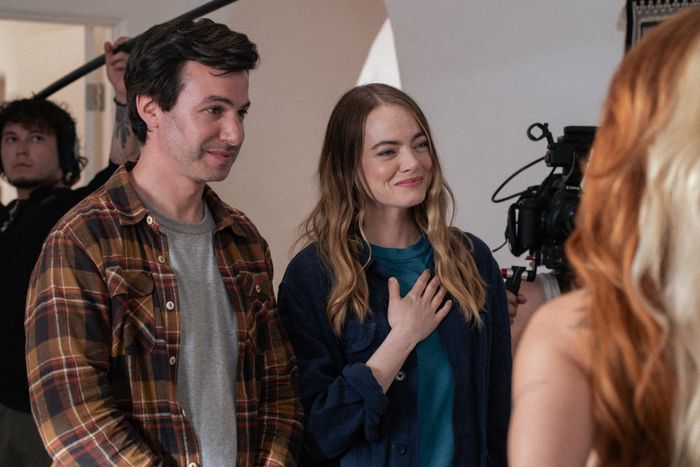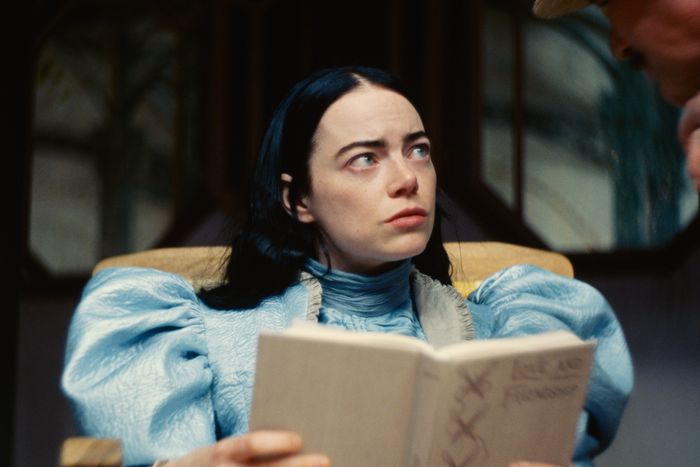
This article was originally published on December 22, 2023. Emma Stone has since won her second Oscar for the leading role in Poor Things and reportedly shaved her head for her fourth collaboration with director Yorgos Lanthimos, set to release in 2025.
The quintessential Emma Stone acting choice comes near the end of Battle of the Sexes, a solid but unremarkable 2017 tennis bio-drama in which she plays Billie Jean King to Steve Carell’s Bobby Riggs. King is all nerves before their famous match; as attendants carry her down a hallway on a garish throne, preparing for a grand entrance, she is visibly fretful over the reputational damage of agreeing to this in the first place. She ducks her head as she enters the stadium — and looks up as she emerges into the light, smiling like a superstar.
It’s a split-second reveal of the machinery behind preternatural charisma. Stone has always known how to let you in on a metamorphosis. Her best roles are those in which her character transforms and ascends: an unknown actress becomes a movie star, a newcomer to the queen’s court acquires power, a talented tennis player turns icon. She doesn’t disappear into her roles; she makes you aware of the games her characters are playing. In All About Eve terms, she’s Bette Davis and she’s Anne Baxter. With her giant eyes — which can project vulnerability or shift into unearthly confidence — and her raspy voice, Stone locates the star inside the striver and vice versa.
More recently, though, she has expanded into roles that distort these tropes. This winter, she stars in both the Showtime series The Curse, as a deluded house flipper who yearns for basic-cable celebrity, and Yorgos Lanthimos’s film Poor Things, as a woman implanted with the brain of an infant who goes on a journey of steampunk self-discovery. In both, the actress seems to be winking at the narratives that defined her earlier work — and it’s clear that she is hitting a new, more experimental high.
Stone, 35, made her name with a distinctly millennial kind of role: the sardonic yet earnest girl next door. For a while, her go-to interview anecdote was about how, as a teenager, she had made a PowerPoint to try to convince her parents she needed to move to L.A. to pursue acting. (As she later explained it, “I make presentations because when I feel strongly about something, I cry.”) After scattered roles in comedies like Superbad, her star-is-born moment was Will Gluck’s 2010 film Easy A, a twee teen update of The Scarlet Letter, in which her character, Olive, pretends to have sex with her gay classmate to help him convince everyone he’s straight. Then she pretends to do it with a bunch more people, too, for the social cachet and just for the hell of it. On paper, it’s an impossible role; she has to be an outcast and a smart aleck and a vlogger as well as charming enough that we believe her classmates believe she could hook up with half the school. That’s where Stone excels. When Olive decides to embrace her identity as a woman of ill repute, strutting down a walkway in Ray-Bans while she mugs and blows kisses, she’s doing an uncool person’s imitation of “cool and hot” in addition to being actually cool and hot. Stone makes Olive relatable: You get that she thinks high-school popularity is dumb and that she wants it anyway.
Easy A took Stone to a new echelon. She was nominated for a Golden Globe (they love an ingénue), won an MTV Movie Award, and hosted Saturday Night Live for the first time. For a while, her career looked like an attempt to follow the path of early-’90s Julia Roberts, another star with megawatt charisma who knows how to let you in on the joke. Stone kept on doing comedies. She took a tiny role in Gluck’s next movie, Friends With Benefits. She starred opposite Ryan Gosling in Crazy, Stupid, Love. She was Gwen Stacy in the rom-comish The Amazing Spider-Man. Her role as the protagonist’s daughter in Alejandro González Iñárritu’s Birdman, from 2014, earned Stone her first Oscar nomination, but the performance, like a lot of that film, is pitched to 11, manic and attention-grabbing without being artful. Her most infamous role may be that of Allison Ng — whose father is supposed to be half-Chinese and half-Hawaiian — in Cameron Crowe’s directionless 2015 comedy, Aloha. (Stone has apologized for this informally: When Sandra Oh made a joke about it onstage at the 2019 Golden Globes, Stone shouted from her seat, “I’m sorry!”)
After Aloha, Stone’s prospects looked uncertain. Studio comedies were on the wane. She wasn’t an obvious choice for dramas, nor was she an indie darling. But Stone picked up a part in La La Land, Damien Chazelle’s reconstructed Hollywood love-story musical. As Mia, a barista and wannabe actress, Stone portrayed the apotheosis of a striver. Mia may cloak her ambition in wry self-deprecation, especially when she flirts with Gosling’s Über-serious jazz musician, but the movie depends on the idea that she deserves to be discovered. Stone’s Oscar win for the role seemed almost inevitable from the scene in which Mia auditions for a big Hollywood film. Over the course of one song, she goes from a shrinking unknown — who cites her aunt who “used to live in Paris” as the dreamer who imparted her love of art — to a star and back, her voice gaining power as she builds through the bridge. In a long take, Chazelle brings us close to Stone as emotion overtakes her face, her eyes glimmering; the camera circles her, and when it comes back around she’s suddenly someone else. Maybe it’s a trick of eyeline: A novice looks down and away from the camera; the star, just above and beyond it.
Stone had her Oscar, but where do you go from there? She did Battle of the Sexes and Netflix’s Maniac, a curio of a series quickly buried by algorithmic churn. But it was during her first collaboration with Lanthimos, in 2018’s The Favourite, when she uncovered a fruitful new valence for her career. She played Abigail, the new girl in the 18th-century court of Olivia Colman’s Queen Anne, who uses her natural star power to scheme her way into the queen’s affections while trying to outflank Anne’s standby, Rachel Weisz. In her most memorable gambit, Stone monologues about her plans while jerking off a young nobleman played by Joe Alwyn. Lanthimos pushes the camera toward Stone’s face, the candlelight bringing out its shadows. Abigail thinks of herself as a victim — “My life is like a maze I continually think I’ve gotten out of,” she mutters — but it’s clear she’s also seizing control of her situation and, literally, of Alwyn.
The Favourite unlocked a darkness in Stone’s performances. While she had always made her characters self-aware, she began to lean harder into deviousness and delusion. On repeat visits to SNL, Stone explored fully unleashed defensiveness as the mother of a sensitive boy in 2016 and, in 2019, as an actress obsessed with finding the truth of her minor character in a gay porno. When she announces, as the star of 2021’s Cruella, that she was “born brilliant, born bad, and a little bit mad,” she plays it cocky, comedic, and entirely heartfelt, pointing herself in a different, possibly freeing, direction: The dreamer becomes a villain. In an interview about that film — a 101 Dalmatians prequel that barely justifies its existence outside Stone’s go-for-broke performance — she admitted that she had been “asking myself a lot of questions about that charm offensive or ingénue idea in my own life.” She was excited by “this phase of playing these women who are much less concerned with what people think about them.”
Now when she plays a woman obsessed with likability, Stone knows she can treat it like a joke — or a trap. In The Curse, her character Whitney’s belief in her own charm is just one of her many self-deceptions. She is the daughter of slumlords who, along with her husband, Asher (Nathan Fielder), runs a house-flipping operation in New Mexico. They build “passive homes” that are obvious rip-offs of other people’s designs and that Whitney tries to fill with work by a Native artist who finds her cringe-inducing. Whitney wants her show to be called Green Queen. She is convinced that she deserves what would amount to HGTV stardom.
It’s a self-immolating role — not least because Stone is from Arizona and played a white savior in The Help. Whitney has all the obliviousness of someone who would take that part in Aloha. In a defining scene, she and Asher stumble into a genuinely sweet moment when he tries to help her out of a sweater and it gets stuck around her head. They collapse into giggles. “This is us, Ash,” Whitney says, then adds, “I wish the network could see this.” She scurries across the room, grabs her phone, and tries to get him to re-create the scene on-camera.
In Poor Things, Stone performs the most literal kind of becoming. She is Bella Baxter, a once-dead woman who has been zapped back to life but with the brain of a baby and must now grow into a worldly, self-actualized individual. The film has its surreal and twisted qualities as well as its obvious ones; the script and direction tend to overemphasize their points about misogyny. As Bella, though, Stone progresses through this strange personal growth without judgment in a performance that has made her an Oscar front-runner. She works with technical precision: As Bella’s brain ages inside her adult body, her gait changes from stilted lumbering to a posture of confidence and control. Her face, which she can spread open with wonder, scrambles with confusion and interest at new ideas and experiences, especially once she heads out to traipse across Europe in search of enlightenment. She’s gloriously uninhibited in the bedroom or while scarfing down her first pastel de nata. On the dance floor with Mark Ruffalo, she cavorts like a Victorian Raggedy Ann. Although Stone has always been good in close-up — and she’s especially good here, those watery irises offset by that jet-black hair — Bella’s discovery comes through her whole physical being.
The film invites allegorical readings. You could interpret it as a comment on what it can be like to chart your own way as a woman in Hollywood or how to find some sense of self even when forced into a role. But it’s also, of all Stone’s metamorphoses, one of the simplest — and the most internal. Olive, Mia, Abigail, and even Whitney long for social acceptance. Bella’s hunger, in the end, isn’t social. What she wants from life is pleasure and knowledge, especially of her body’s forgotten history. She’s trying to become herself.
More on ‘poor things’
- Yorgos Lanthimos Is Not Your Friend
- Movie Masturbation Scenes, Ranked
- Every Emma Stone Movie, Ranked




